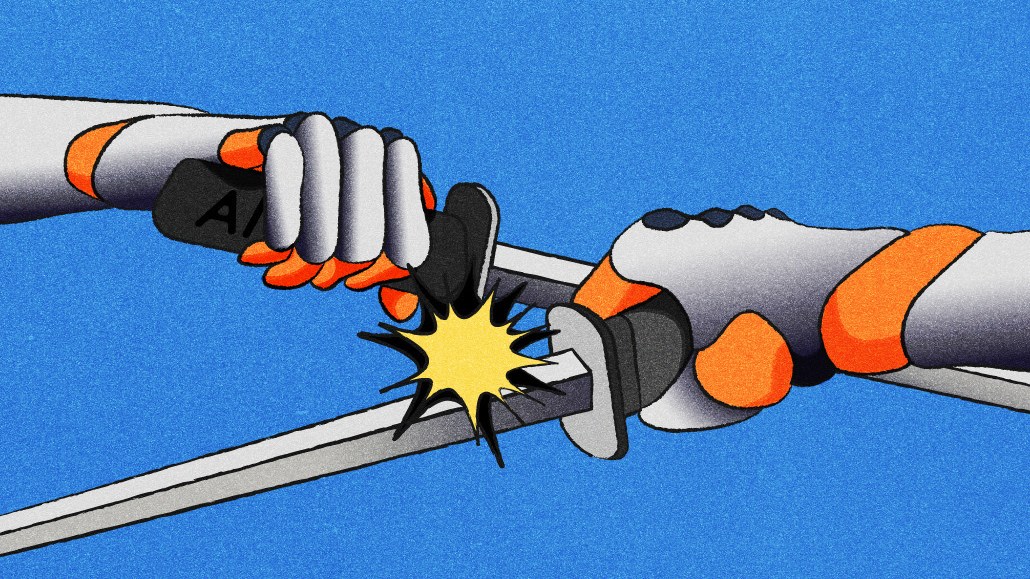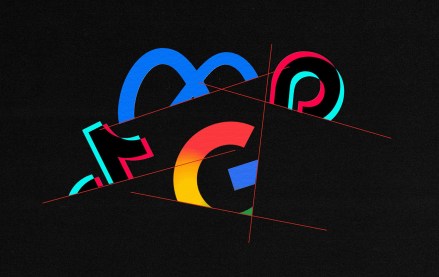
Google’s rollout of AI Mode to search has rattled publishers, reinforcing fears of a future where the platform stops sending traffic to publishers’ sites outright in lieu of their AI-generated summaries.
While that may still be a ways away, Google’s other generative AI search feature AI Overviews has already given publishers a glimpse into a future of Google search without the classic blue links. Daily Mail reported a nearly 44% lower clickthrough rate since the debut of AI Overviews. Another publishing exec told Digiday they had seen a 1-4% decline in page views.
So who stands to gain from AI Mode? And what else is threatened by Google’s integration of AI in search?
Check out Digiday’s list of the winners and losers of AI Mode:
Winners
Google has been pushing into the AI search space with fervor ever since ChatGPT’s breakout success from competitor OpenAI.
But now, Google may have the distribution edge on its AI rivals. By integrating AI Mode directly into Search — a product used by billions daily — Google can quietly onboard users into its AI experience at scale, giving it a massive built-in advantage over standalone platforms like ChatGPT or Perplexity.
So far, Google has faced a delicate balancing act: competing with AI rivals while avoiding compromising the profitability of its existing search engine (it generated $66.89 billion in ad revenue in Q1 2025 — the bulk of which is from search ads) and alienating publishers on whose quality content it relies. But any opacity around the extent of Google’s AI ambitions was stamped out following the company’s stream of announcements at its annual I/O developer conference last week where it announced that Google’s AI Mode will be monetized with ads.
Google is already posturing users as turning to its search function for complicated tasks. Users’ queries in AI Mode were two to three times the length of traditional searches, Google CEO Sundar Pichai said during the company’s I/O developer conference last week.
Ads will be shown on that deeper search experience — when users ask multiple questions from an original query in AI Mode.
That means Google can collect a load of data from AI Mode users. And ads in AI Mode may be more contextually relevant (based on the additional insight from those longer, more complicated queries). It could mean higher click-through rates on ads in AI Mode — and ultimately, more profit.
“With less and less traffic going outside and remaining in Google, it means ad networks will not get as much traffic, which means that ad prices will be more expensive, because people will be competing to appear in the limited real estate [in AI Mode], versus the multiple-step journeys that they were doing in search,” said John Shehata, founder of SEO data platforms NewzDash and GDdash.
It’s a bet Google is willing to take. For what it’s worth, OpenAI hasn’t launched an ads business for ChatGPT Search (yet). Perplexity has, but six months in and it hasn’t exactly taken off. Uncertainty in the current macroeconomic environment means advertisers are hesitant to spend against experimental buys right now. That attitude doesn’t bode well for Google’s AI Mode ad business. Then again, Perplexity is just a small fish in the growing AI pond. Google is — well, Google.
Advertisers
For now, Google will pull ads from existing Search and Shopping campaigns for ad placements within AI Mode.
AI Mode’s “fan-out” approach (which breaks down search queries into subtopics) to answering users’ queries is an opportunity for advertisers, according to Calvin Scharffs, vp of marketing at marketing and ad agency Direct Digital Holdings. At least, as long as advertisers can shift to the “new norm” of long-form, niche and qualified keywords in conversational searches, as opposed to traditional keywords.
“We need to be prepared not just to hook the click, but hook the user even if they never click on an ad. This kind of hyper-personalized, conversational experience is what AI adopters expect,” Scharffs said. “Advertisers in high-consideration categories like healthcare, financial services or travel – where trust, nuance and timing matter – are well-positioned,” he said.
Dan Taylor, vp of global ads at Google, said in a recent Digiday Podcast episode that AI Mode ads will have the same cost-per-click pricing models as Google Ads. Advertisers can also buy ads on a cost-per-acquisition basis, focus on a target return on ad spend and multiple other models, he added.
Publishers with advanced diversification strategies
Most publishers are concerned about what AI Mode means for their Google referral traffic. But the publishers that are less panicked are the ones that have already worked to diversify away from Google Search, and prioritize direct relationships with their readers through memberships, subscriptions, newsletters and apps.
That’s a strategy some have already adopted. Dotdash Meredith is working on cutting its dependence on Google referral traffic, and focusing on building direct audience capabilities and products, according to CEO Neil Vogel.
Two publishing execs at organizations that have large subscription bases (in addition to their advertising businesses) shrugged off the suggestion that AI Mode’s arrival meant publishers had to scramble to find alternative ways to drive traffic. Instead, they told Digiday their outlets were reinvesting in ways to convert readers into paying, loyal members or newsletter subscribers.
Retail media networks
Retail media networks may also benefit from AI Mode, as the feature is especially strong in answering shopping-related queries (e.g., “best moisturizer for dry skin,”). These queries can lead to more product discovery and personalized shopping recommendations within AI-generated summaries and ads, according to Damien Bianchi, group media director of retail media & commerce at agency VML. Imagine an AI summary recommending a specific brand of running shoes, based on a user’s past purchases and running habits, he said.
But there are some caveats. The gains RMNs stand to make from AI Mode could be threatened by the same threats to publishers – reduced click-throughs to RMN’s sites, decreased visibility with limited product ads and dependence on Google’s algorithm, Bianchi said.
Losers
Publishers, mostly – but especially news, product review and recipes sites
Google has made it clear: AI is building the future of search. Publishing execs are worried the shift to giving users the information they are looking for right in the search results page means fewer click-throughs, fewer impressions and less digital ad revenue.
“The blue links were the last vestige of hope that we had for any sort of revenue,” said Danielle Coffey, president and CEO of the News/Media Alliance.
About five years ago, News/Media Alliance members had about 50-80% of their traffic come from Google. That’s now down to 20-30%, according to an “informal analysis” the organization conducted, Coffey said.
The problem is that publishers can’t opt out of having their work included in Google’s AI search features without opting out of appearing in search results entirely. That’s not much of a choice, Coffey said.
But some publishers are more at risk of getting hurt by AI Mode than others. News publishers, for example, weren’t seeing the CTR declines that other publishers were seeing since the rollout of AI Overviews, because those AI-generated summaries in Google Search results weren’t triggered by hard news queries. Neither were some food bloggers who hadn’t seen their recipes appear in AI Overviews, according to Tom Critchlow, Raptive’s evp of audience growth.
But AI Mode can respond to breaking news faster. The feature was able to provide information on a report one news outlet had covered just 10 minutes after it had published a story on it, according to a publishing exec who requested anonymity. And Raptive tests found that AI Mode would generate full recipes from food bloggers’ sites when prompted, without clear links back to those sites, Critchlow said.
Traditional traffic metrics
CTR measurement from Google is on a downward spiral. Google won’t let publishers track click-through rates from AI Mode (or AI Overviews, for that matter). Google has said a trackable metric would be available in dashboards “soon.”
That changes the game for advertisers. “In terms of traditional metrics, such as clicks, volume is no longer the goal – quality is,” Scharffs said. “We no longer need to ‘win’ auctions, as was the case several years ago, when using impression shares or clicks as KPIs for share of voice. The goal now needs to be ‘winning’ the end user, focusing on engagement, and customer lifetime value.”
And for publishers. “Traffic or visits will no longer be the primary metric. It’s visibility and impressions,” Shehata said. Things are going to be “foggy” for a while, as publishers adjust to this new landscape, he noted.
SEO consultancies
So what does that mean for SEO consultancies? Many of them are at risk.
The SEO software industry – valued at $84.94 billion – is “on the brink of major change,” said Michael King, founder and CEO of a content marketing and SEO agency iPullRank.
“Google now ranks based on contextual relevance, not just keywords or backlinks. It uses AI and vector embeddings to evaluate who created content, how trustworthy it is, and how it fits within its broader knowledge graph,” King said. “Most SEO tools and practices haven’t caught up. As new APIs and metrics become more accessible, we’ll see a new generation of SEO roles and tools emerge that align with how Google actually works.”
Traditional SEO consultancies are having to pivot their businesses. Jim Robinson, founder of Clickseed, is shifting to work in B2B marketing.
“It doesn’t seem like Google is a reliable channel, where I can tell a publisher, ‘I’m reasonably confident I can get you more exposure.’ I don’t know if I can do that in one or two years from now,” Robinson said.
More in Media

Digiday+ Research: Nearly half of publishers report an increase in referral traffic from social
Nearly half of publishers have seen an increase over the last year in the referral traffic they get from social media platforms, according to a Digiday+ Research survey.

Boston Globe, Future, Vox Media join ProRata’s generative AI licensing model
A fresh wave of publishers have signed up for ProRata’s revenue share program, and some are adding its AI search engine to their sites.

Media Briefing: Affiliate isn’t dead, say publishers – but it must evolve in the AI era
Publishers say affiliate and commerce businesses need to evolve in the AI search era.







